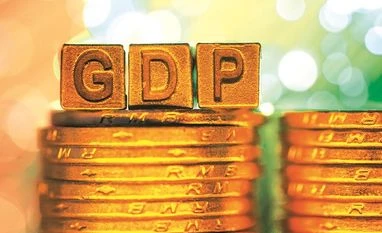The country's economic growth in the fourth quarter ended March 2019 is expected to moderate to 6.1-5.9 per cent, which could pull down growth rate for the entire fiscal 2018-19 to below 7 per cent, according to a report by SBI.
The slip in GDP growth may force the Reserve Bank of India to move with a deeper 0.50 per cent cut in rates at its next review to propel the sluggish economy, the SBI Ecowrap report said Monday.
The growth could come at 6.1-5.9 per cent for the January-March period, getting the full-year growth to 6.9 per cent, an estimate by the economic researchers at the country's largest lender SBI ahead of the announcement of official data on Thursday, said.
"We expect GDP growth for Q4FY19 at 6.1 per cent. GVA (gross value added) growth could be at 6 per cent or slip marginally below 6 per cent at 5.9 per cent. FY19 GDP growth will be at 6.9 per cent," it said.
However, it added that the current slowdown can be "transitory" if proper policies are adopted in the interim.
Calling out the high real interest rates -- the differential between the policy rate and headline inflation -- as an impediment to investment, it said the RBI can cut rates by 0.35-0.50 per cent at its next policy announcement.
The RBI's larger rate cut can be effective only if transmission of the rates happens quickly, it said, suggesting a few factors that the central bank needs to keep in mind while delivering a rate cut.
Pointing out to the cumulative rate cuts of 0.50 per cent by the Reserve Bank of India (RBI) since February, the note said the median marginal cost of funds-based lending rate by banks has moved down by only 0.07 per cent.
The first will be to ensure adoption of external benchmark rate which moves in with the RBI's repo rate.
"Ensure that asset and liability side of the banks move in tandem and ensure repo rate is directly benchmarked to external benchmark/non-volatile bank liabilities/CASA that are mostly used for transaction purposes," it said.
Otherwise, it would continue to be constrained by lack of transmission, even as the RBI will continue to cut rates, it said.
The RBI, which will be undertaking its second monetary policy review on June 6, also has to ensure that liquidity is "plentiful" in the system, amid muted government spending and currency leakage due to elections.
It can also use the "potent" weapon of cutting the cash reserve ratio (CRR) or merge CRR in liquidity coverage ratio estimation, the note said, calling this as a "less likely" measure.
One percentage point cut in the CRR can release Rs 1.28 lakh crore, reduce lending rates by 0.15 per cent and improve banks' profitability by Rs 12,000 crore annually.
Analysts at private sector lender ICICI Bank pointed out that slowdown in growth is a key factor which the new government will have to grapple with and also hinted at help needed from the RBI to tackle the same.
"We expect growth rates to stay weak but a combination of strong government policy support and benign monetary policy environment should lead to recovery in growth prospects towards the second half of this fiscal year (FY20)," it said.
It can be noted that inflation has been inching up lately and even the RBI, which is mandated to keep the price rise at four per cent in the medium term, has also estimated the same to rise.
Economists at domestic rating agency Care Ratings estimated headline inflation to rise to 4 per cent in 2019-20 as against 3.4 per cent in 2018-19.
GDP growth will inch up to 7.2 per cent in FY20 from the 7 per cent it expects in FY19.
The new government will have to balance policy imperatives to ensure that growth receives a boost in the short term and also continue with more long term reform activity, ICICI Bank report said.
"We believe, post elections, capital flows will pick up materially and thus RBI will be able to recoup dollars and add to foreign exchange reserves and thus attendant domestic liquidity. In fact, since the exit polls and subsequent results, there has been inflow into the market of around Rs 4,000 crore," it said.
Commenting on its fourth quarter estimate of a slip in GDP growth to just above 6 per cent, the SBI note said both the investment demand and consumption demand is showing signs of moderation as revealed by various leading indicators.
Performance of the fast-moving consumer goods sector is also "lacklustre" with a deceleration in demand for staples such as biscuits and soaps, it said.
You’ve reached your limit of {{free_limit}} free articles this month.
Subscribe now for unlimited access.
Already subscribed? Log in
Subscribe to read the full story →

Smart Quarterly
₹900
3 Months
₹300/Month
Smart Essential
₹2,700
1 Year
₹225/Month
Super Saver
₹3,900
2 Years
₹162/Month
Renews automatically, cancel anytime
Here’s what’s included in our digital subscription plans
Exclusive premium stories online
Over 30 premium stories daily, handpicked by our editors


Complimentary Access to The New York Times
News, Games, Cooking, Audio, Wirecutter & The Athletic
Business Standard Epaper
Digital replica of our daily newspaper — with options to read, save, and share


Curated Newsletters
Insights on markets, finance, politics, tech, and more delivered to your inbox
Market Analysis & Investment Insights
In-depth market analysis & insights with access to The Smart Investor


Archives
Repository of articles and publications dating back to 1997
Ad-free Reading
Uninterrupted reading experience with no advertisements


Seamless Access Across All Devices
Access Business Standard across devices — mobile, tablet, or PC, via web or app
)

